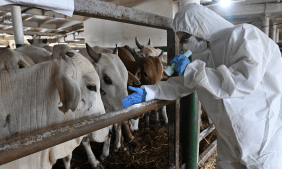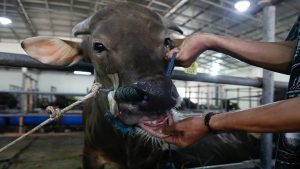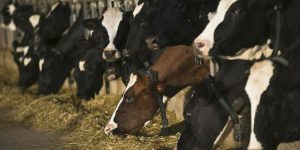Cloven hoof livestock farmers and related industry role players demand financial compensation for their losses.
This, as many of these farmers have continued to incur losses following the banning of the transportation of cloven hoof livestock, including cattle, as the outbreak of foot-and-mouth disease is on the increase.
The country is currently experiencing an outbreak of foot-and-mouth disease on farms and communal areas in the Free State, KwaZulu-Natal, Limpopo, North West and Gauteng.
Despite a complete ban on the sale and transportation of cloven hoof livestock, foot and mouth statistics show a worrying uptake, which has had a detrimental effect on the market.
Before the ban, the auction was a vibrant market for both farmers and buyers, but now only a few chickens, goats, and pigs are being sold.
North West auctioneer Steinman Coetzee says, “We have been advising them since last time, already since April that this is going to happen if they don’t stop the feedlots from their reckless buying of cattle. That is what we told them because these biosecurity measures should be applicable to them as well, not only for us. I think the problem here with all the organisations is every time somebody decides about red meat they forget the producers, in other words, the farmers. They are actually the most crucial part of this without them there is no red meat industry.”
Outbreak
Farmers say they have felt the brunt of the outbreak with little assistance from authorities.
One farmer says, “Nobody has come to inspect our stock. I think by now they must know such a farm and that one and that one are affected, the others are free.”
Another says, “This disease doesn’t come from our area. It comes with mainly imported animals…now they must regulate the feedlots if a feedlot must just sell to the abattoirs.”
The South African Feedlot Association’s Dewald Olivier says they should not be blamed for the current outbreak.
Olivier says, “I am not aware of any feedlots that buy or move animals in a reckless or seemingly complacent manner during the ban that was imposed on the industry other than moving animals with the necessary Red Cross permits for slaughter. I am not aware of any feedlots to that effect also moving any animals in a reckless or seemingly complacent manner at all over all, animals that are bought by feedlots reach an end within the feedlot. They are not sold on or from the feedlot.”
Cases
Agricultural authorities say at least 11 new cases have been reported in the period between 18 and 22 August with a total of 127 infections nationally since the outbreak began.
The national department of agriculture says they have already instituted criminal charges against those responsible for the initial spread.
Department spokesperson Reggie Ngcobo says, “Criminal charges are being investigated against suspects in the Free State and North West. The current outbreak is happening at feedlots, not communal areas and had feedlots and commercial farms observed basic biosecurity law we wouldn’t be experiencing this unprecedented outbreak.”
VIDEO: Acting deputy director-general of Agriculture Production, Biosecurity and Natural Resources Management on KZN introducing stricter measures to curb the spread:






